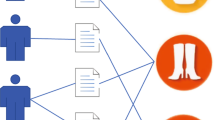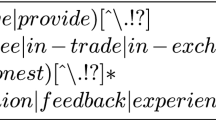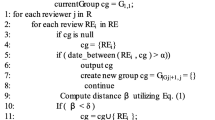Abstract
Online reviews play a crucial role in the ecosystem of e-commerce business. To manipulate consumers’ opinions, some sellers of e-commerce platforms outsource opinion spamming with incentives (e.g., free products) in exchange for incentivized reviews. As incentives, by nature, are likely to drive more biased reviews or even fake reviews. Despite e-commerce platforms such as Amazon have taken initiatives to squash the incentivized review practice, sellers turn to various social networking platforms (e.g., Facebook) to outsource the incentivized reviews. The aggregation of sellers who request incentivized reviews and reviewers who seek incentives forms incentivized review groups. In this paper, we focus on the incentivized review groups in e-commerce platforms. We perform data collections from various social networking platforms, including Facebook, WeChat, and Douban. A measurement study of incentivized review groups is conducted with regards to group members, group activities, and products. To identify the incentivized review groups, we propose a new detection approach based on co-review graphs. Specifically, we employ the community detection method to find suspicious communities from co-review graphs. Also, we build a “gold standard” dataset from the data we collected, which contains the information of reviewers who belong to incentivized review groups. We utilize the “gold standard” dataset to evaluate the effectiveness of our detection approach.
Access this chapter
Tax calculation will be finalised at checkout
Purchases are for personal use only
Similar content being viewed by others
References
Amazon bans incentivized reviews (2016). https://www.usatoday.com/story/tech/news/2016/10/03/amazon-bans-incentivized-reviews/91488702/
Amazon consumer review policy (2016). https://www.amazon.com/gp/help/customer/display.html?nodeId=201967050
Consumer review survey (2017). https://www.brightlocal.com/research/local-consumer-review-survey/
Blondel, V.D., Guillaume, J.-L., Lambiotte, R., Lefebvre, E.: Fast unfolding of communities in large networks. J. Stat. Mech. Theo. Exp. 2008(10), P10008 (2008)
Cai, Q., Filos-Ratsikas, A., Tang, P., Zhang, Y.: Reinforcement mechanism design for fraudulent behaviour in e-commerce. In: The 32nd AAAI Conference on Artificial Intelligence (2018)
Chen, H., He, D., Zhu, S., Yang, J.: Toward detecting collusive ranking manipulation attackers in mobile app markets. In: The 2017 ACM on Asia Conference on Computer and Communications Security (2017)
Feng, S., Banerjee, R., Choi, Y.: Syntactic stylometry for deception detection. In: The 50th Annual Meeting of the Association for Computational Linguistics: Short Papers, vol. 2, pp. 171–175. Association for Computational Linguistics (2012)
Fusilier, D.H., Montes-y-Gómez, M., Rosso, P., Cabrera, R.G.: Detection of opinion spam with character n-grams. In: Gelbukh, A. (ed.) CICLing 2015. LNCS, vol. 9042, pp. 285–294. Springer, Cham (2015). https://doi.org/10.1007/978-3-319-18117-2_21
Harris, C.G.: Detecting deceptive opinion spam using human computation. In: Workshops at the Twenty-Sixth AAAI Conference on Artificial Intelligence (2012)
He, R., McAuley, J.: Ups and downs: modeling the visual evolution of fashion trends with one-class collaborative filtering. In: Proceedings of the 25th International Conference on World Wide Web (WWW), pp. 507–517 (2016)
Jamshidi, S., Rejaie, R., Li, J.: Trojan horses in amazon’s castle: understanding the incentivized online reviews. In: 2018 IEEE/ACM International Conference on Advances in Social Networks Analysis and Mining (2018)
Kleinberg, J.: Bursty and hierarchical structure in streams. Data Min. Knowl. Disc. 7(4), 373–397 (2003)
Li, J., Ott, M., Cardie, C., Hovy, E.: Towards a general rule for identifying deceptive opinion spam. In: The 52nd Annual Meeting of the Association for Computational Linguistics, vol. 1 (2014)
Li, S., Caverlee, J., Niu, W., Kaghazgaran, P.: Crowdsourced app review manipulation. In: The 40th International ACM SIGIR Conference on Research and Development in Information Retrieval (2017)
Mukherjee, A., Liu, B., Glance, N.: Spotting fake reviewer groups in consumer reviews. In: The 21st International Conference on World Wide Web (WWW) (2012)
Mukherjee, A., Venkataraman, V., Liu, B., Glance, N.S.: What yelp fake review filter might be doing? In: The International AAAI Conference on Web and Social Media (ICWSM) (2013)
Ni, J., Li, J., McAuley, J.: Justifying recommendations using distantly-labeled reviews and fine-grained aspects. In: The Empirical Methods in Natural Language Processing and International Joint Conference on Natural Language Processing (EMNLP-IJCNLP) (2019)
Ott, M., Cardie, C., Hancock, J.T.: Negative deceptive opinion spam. In: The 2013 Conference of the North American Chapter of the Association for Computational Linguistics: Human Language Technologies (2013)
Ott, M., Choi, Y., Cardie, C., Hancock, J.T.: Finding deceptive opinion spam by any stretch of the imagination. In: The 49th Annual Meeting of the Association for Computational Linguistics: Human Language Technologies, vol. 1. Association for Computational Linguistics (2011)
Palla, G., Derényi, I., Farkas, I., Vicsek, T.: Uncovering the overlapping community structure of complex networks in nature and society. Nature 435(7043), 814 (2005)
Raghavan, U.N., Albert, R., Kumara, S.: Near linear time algorithm to detect community structures in large-scale networks. Phys. Rev. E 76(3), 036106 (2007)
Rayana, S., Akoglu, L.: Collective opinion spam detection: bridging review networks and metadata. In: Proceedings of the 21th ACM SIGKDD International Conference on Knowledge Discovery and Data Mining (2015)
Rosvall, M., Bergstrom, C.T.: Maps of random walks on complex networks reveal community structure. Proc. Nat. Acad. Sci. 105(4), 1118–1123 (2008)
Wang, G., Xie, S., Liu, B., Philip, S.Y.: Review graph based online store review spammer detection. In: 2011 IEEE 11th International Conference on Data Mining (2011)
Xie, S., Wang, G., Lin, S., Yu, P.S.: Review spam detection via temporal pattern discovery. In: Proceedings of the 18th ACM SIGKDD International Conference on Knowledge Discovery and Data Mining (2012)
Xie, Z., Zhu, S.: AppWatcher: unveiling the underground market of trading mobile app reviews. In: The 8th ACM Conference on Security & Privacy in Wireless and Mobile Networks, p. 10 (2015)
Xie, Z., Zhu, S., Li, Q., Wang, W.: You can promote, but you can’t hide: large-scale abused app detection in mobile app stores. In: The 32nd Annual Conference on Computer Security Applications (2016)
Xu, H., Liu, D., Wang, H., Stavrou, A.: E-commerce reputation manipulation: the emergence of reputation-escalation-as-a-service. In: International Conference on World Wide Web (WWW), pp. 1296–1306 (2015)
Yao, Y., Viswanath, B., Cryan, J., Zheng, H., Zhao, B.Y.: Automated crowdturfing attacks and defenses in online review systems. In: Proceedings of the 2017 ACM SIGSAC Conference on Computer and Communications Security (2017)
Zheng, H., et al.: Smoke screener or straight shooter: detecting elite Sybil attacks in user-review social networks. In: NDSS (2018)
Acknowledgment
We would like to thank our shepherd Mohammad Mannan and the anonymous reviewers for their detailed and insightful comments, which help to improve the quality of this paper. This work was supported in part by the U.S. ARO grant W911NF-19-1-0049 and NSF grant DGE-1821744.
Author information
Authors and Affiliations
Corresponding author
Editor information
Editors and Affiliations
Rights and permissions
Copyright information
© 2020 ICST Institute for Computer Sciences, Social Informatics and Telecommunications Engineering
About this paper
Cite this paper
Zhang, Y., Hao, S., Wang, H. (2020). Review Trade: Everything Is Free in Incentivized Review Groups. In: Park, N., Sun, K., Foresti, S., Butler, K., Saxena, N. (eds) Security and Privacy in Communication Networks. SecureComm 2020. Lecture Notes of the Institute for Computer Sciences, Social Informatics and Telecommunications Engineering, vol 335. Springer, Cham. https://doi.org/10.1007/978-3-030-63086-7_19
Download citation
DOI: https://doi.org/10.1007/978-3-030-63086-7_19
Published:
Publisher Name: Springer, Cham
Print ISBN: 978-3-030-63085-0
Online ISBN: 978-3-030-63086-7
eBook Packages: Computer ScienceComputer Science (R0)




